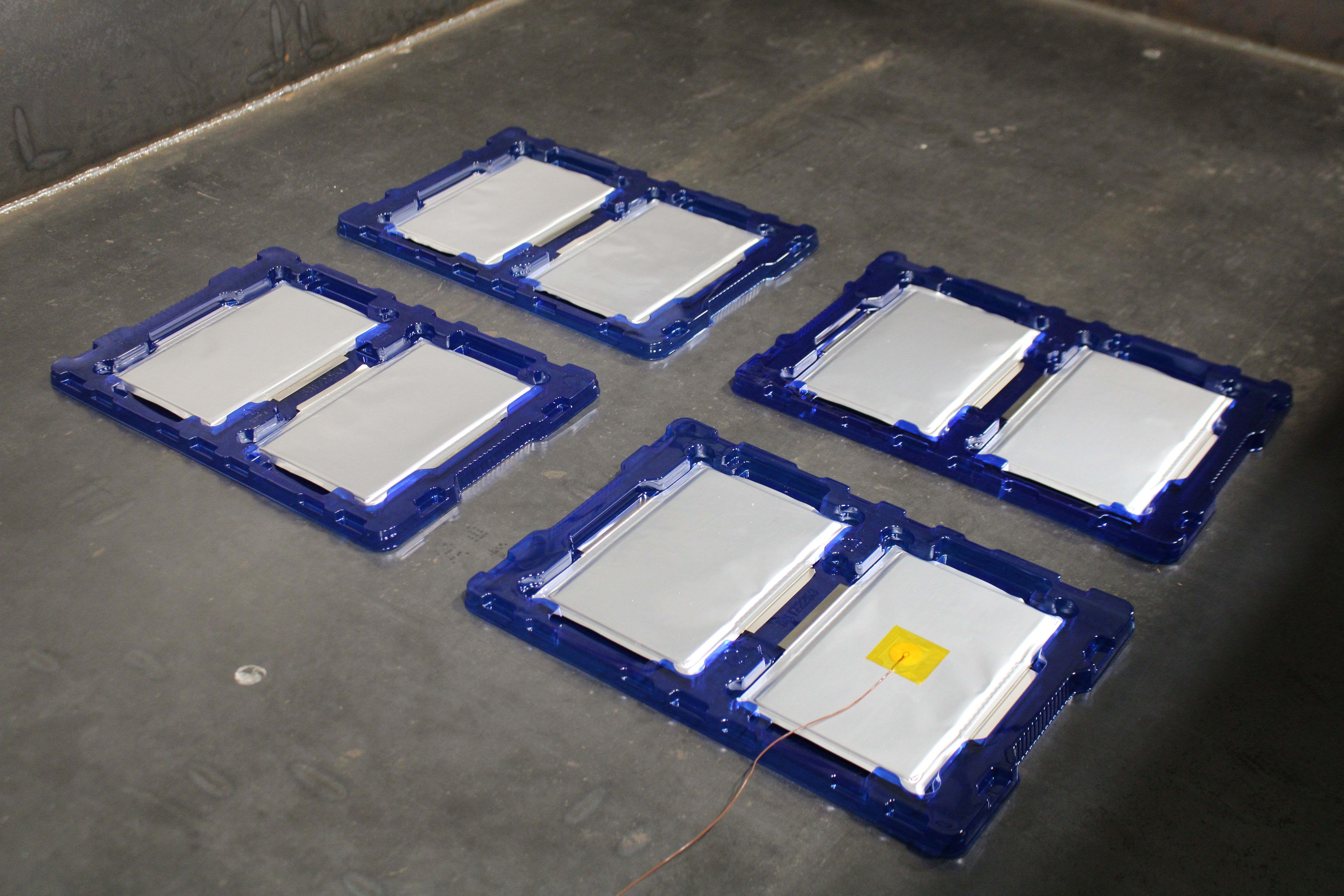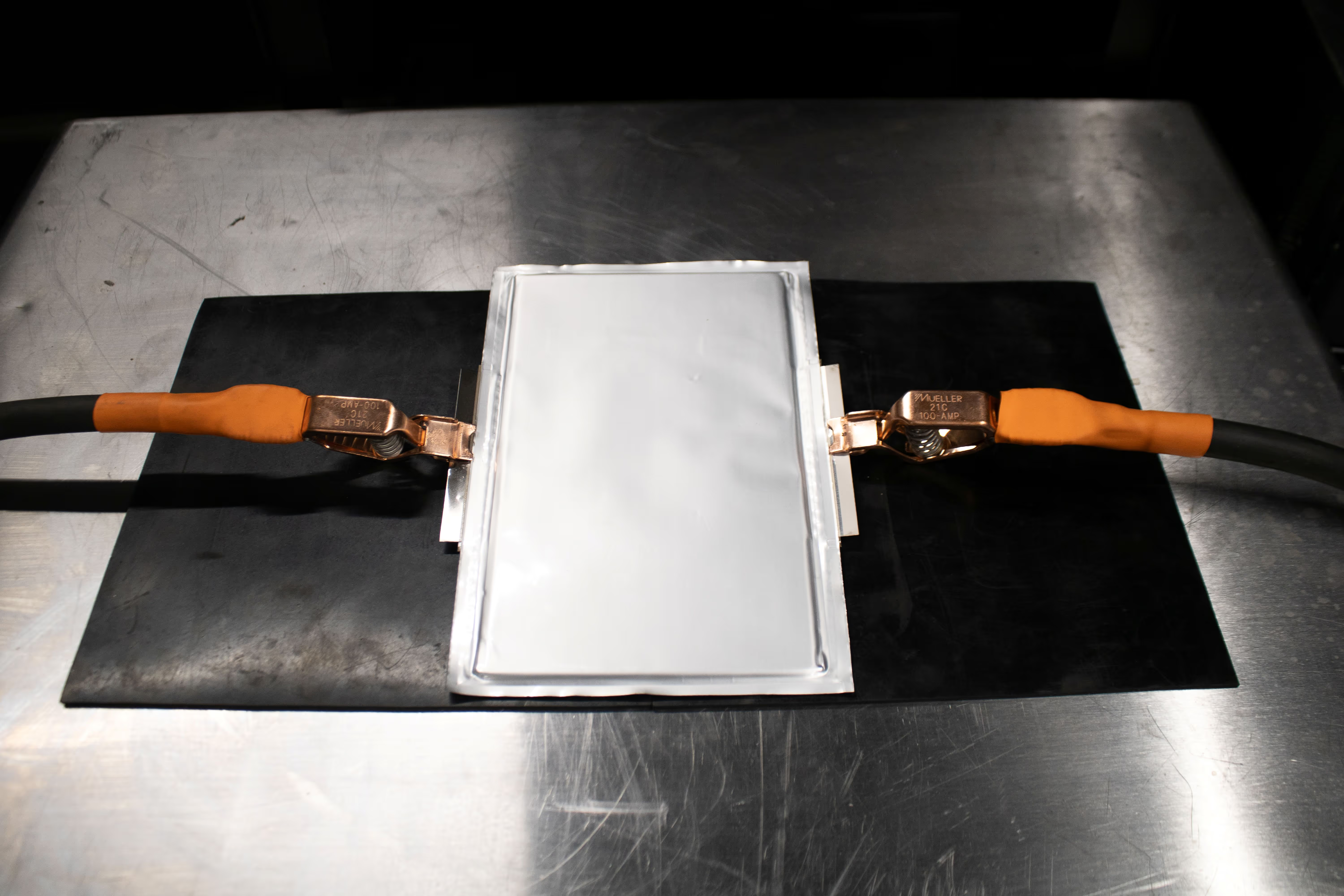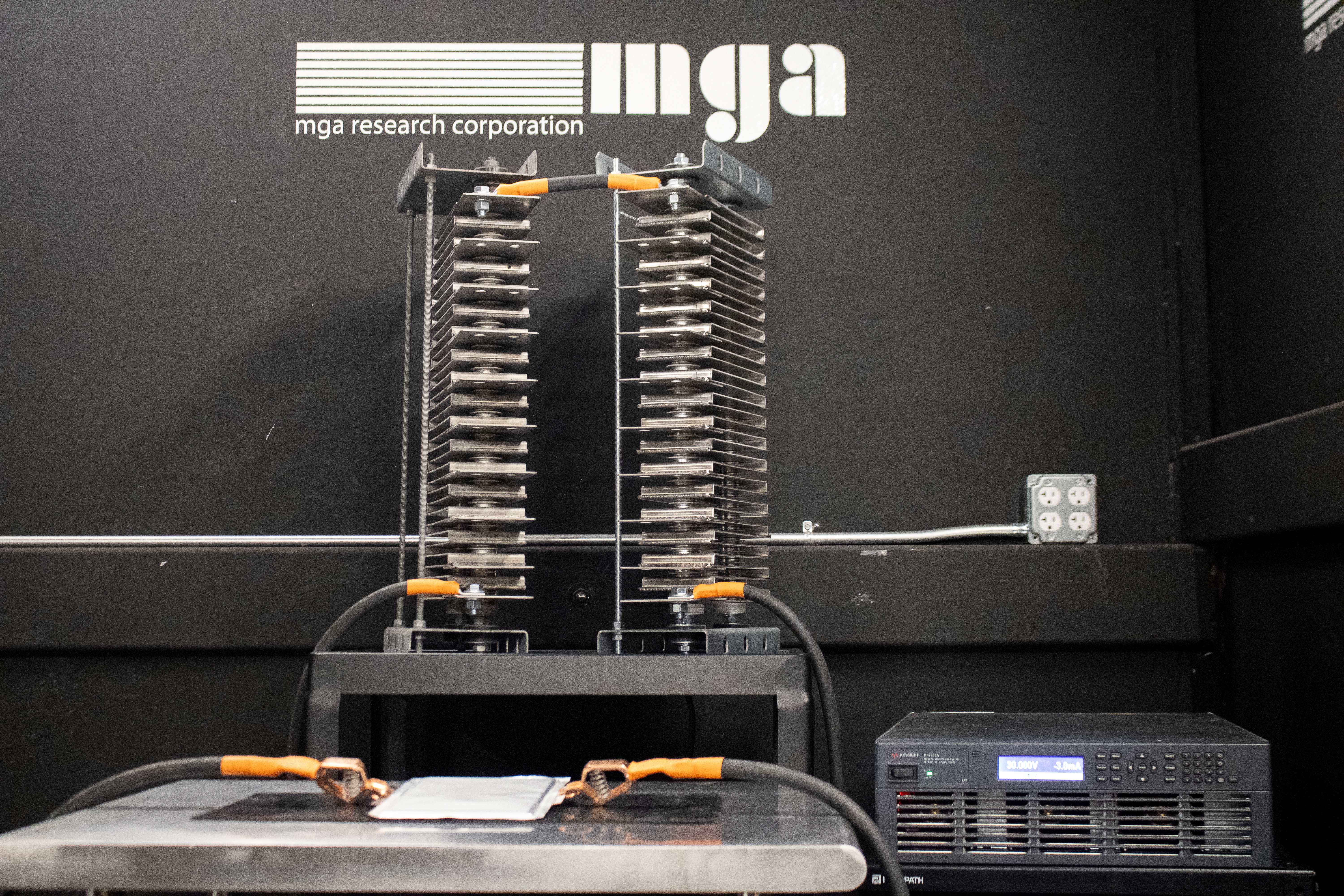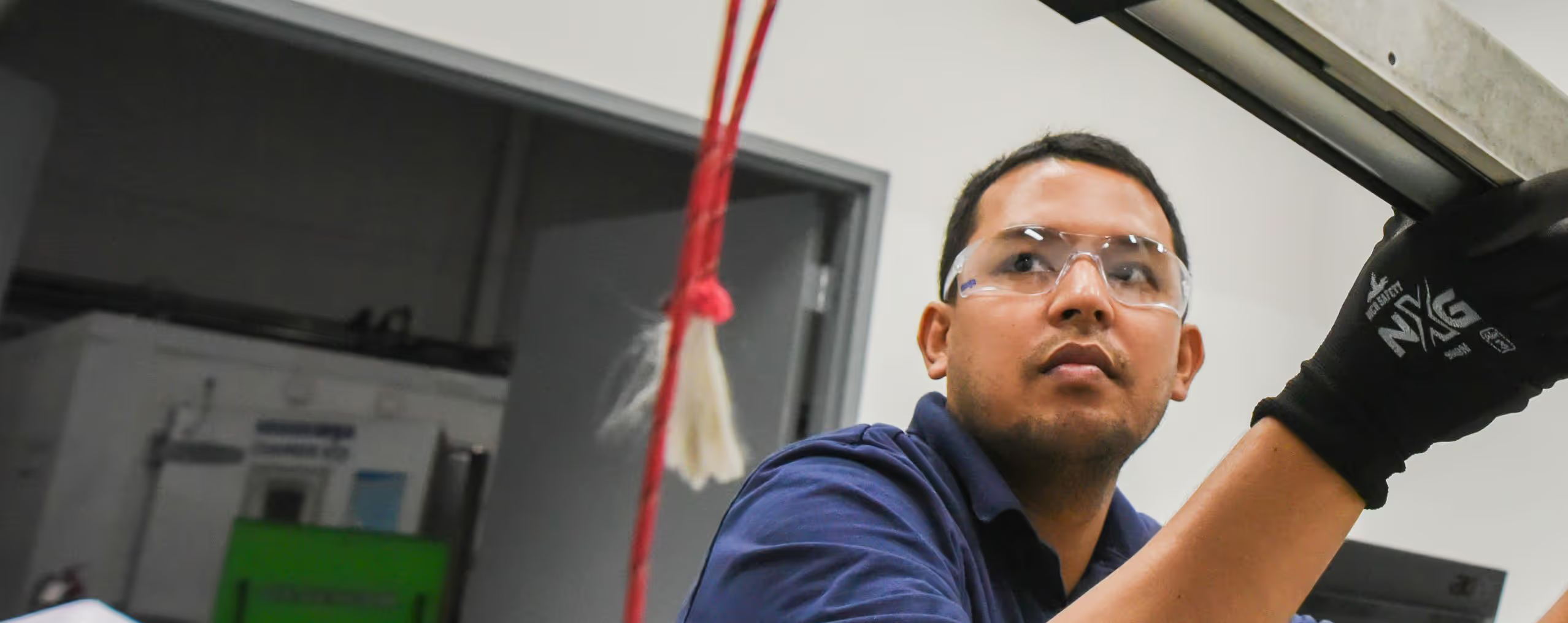
Battery Testing: UN38.3
MGA Research provides comprehensive UN38.3 battery testing services across three ISO 17025 accredited facilities, ensuring the safe transportation of lithium batteries through rigorous safety evaluations that meet United Nations requirements for cells, modules, and full battery packs.
Quick Overview


Comprehensive UN38.3 Testing
We offer complete UN38.3 battery testing across three facilities in New York, Michigan, and Wisconsin, including altitude simulation, thermal cycling, vibration, shock, and abuse tests, to thoroughly assess battery safety.

Multi-Stage Test Support
We provide dedicated testing services for each stage of battery development: cell, module, and full pack ensuring complete safety validation
.avif)
Accredited Testing
Our battery test facilities are ISO 17025:2017 accredited for UN38.3 testing, demonstrating our commitment to precision and reliability in battery safety evaluations
MGA Research Corporation has a long history of performing UN38.3 testing. Our laboratory locations in Burlington, Wisconsin, Holly, Michigan, and Akron, New York, enable our team to have extensive experience performing testing at the cell, module, and pack levels. With all capabilities available, including fixture design and fabrication, MGA is a one-stop shop for customers seeking comprehensive solutions within the electrification industry.
MGA’s battery testing facilities are purpose-built to support UN38.3 compliance and address the critical safety, confidentiality, and methodology requirements of our customers. Designed with adaptability in mind, our labs evolve alongside the rapidly advancing battery industry, ensuring readiness for new technologies and standards.



What is UN38.3 Testing?
38.3 is the test section of the United Nations schemes for the classification of dangerous goods subject to transport regulations. The purpose of UN 38.3 testing is to ensure the safe transport of lithium metal, lithium ion, and sodium ion batteries. Most carriers and freight companies require UN38.3 certification before accepting lithium batteries or products containing them.
The Eight UN38.3 Test Procedures
Test T.1: Altitude Simulation
- This test simulates air transport under low-pressure conditions. Testing is performed in MGA built altitude chamber.
- Test samples are stored at a pressure of 11.6 kPa or less for at lease 6 hours at ambient hours.
- Samples meet requirement if there is no leakage, no venting, no disassembly, no rupture and no fire and no fire and if the open circuit voltage of each test cell or battery after testing is not less than 90% of its voltage immediately prior to the procedure. The requirement relating to voltage is not applicable to test cells and batteries at fully discharged states.
Test T.2: Thermal Test
- This test assesses cell and battery seal integrity and internal electrical connections. The test is conducted using rapid and extreme temperature changes. Testing is performed in a thermal shock chamber for cells and small batteries, or two walk-in chambers for large packs.
- Test cells and batteries are stored for at least 6 hours at 72±2°C followed by storage for at least 6 hours at -40±2°C. This cycle is repeated until 10 cycles are complete, followed by a 24 hour soak at ambient temperatures. For large cells and batteries the duration of temperature exposure is for at least 12 hours at each temperature.
- Cells and batteries meet requirement if there is no leakage, no venting, no disassembly, no rupture and no fire and no fire and if the open circuit voltage of each test cell or battery after testing is not less than 90% of its voltage immediately prior to the procedure. The requirement relating to voltage is not applicable to test cells and batteries at fully discharged states.
Test T.3: Vibration Test
- Test simulates vibration during transport. Testing is performed on our ED vibration tables.
- The vibration is a sinusoidal waveform with a logarithmic sweep between 7Hz and 200Hz and back to 7Hz transversed in 15 minutes. This cycle is repeated 12 times for a total of 3 hours in each of the 3 axes. The logarithmic frequency sweep is different for cells and batteries with a gross mass less than 12kg (cells and small batteries), and for batteries with a gross mass greater than 12kg (large batteries)
- Cells and batteries meet requirement if there is no leakage, no venting, no disassembly, no rupture and no fire, and if the open circuit voltage of each test cell or battery after testing is not less than 90% of its voltage immediately prior to the procedure. The requirement relating to voltage is not applicable to test cells and batteries at fully discharged states.
Test T.4: Shock Test
- This test assesses the robustness of the cells and batteries against cumulative shocks. Testing is performed on the shock tower or ED vibration tables.
- Cells are subjected to a half-sine shock with a peak acceleration if 150g and a pulse duration of 6 milliseconds. Large cells are subjected to a half-sine shock of peak acceleration of 50g and a pulse duration of 11 milliseconds.
- Batteries are subjected to a half-sine shock with a peak acceleration depending on the mass of the battery. The pulse duration shall be 6 milliseconds for small batteries and 11 milliseconds for large batteries.
- Each cell and battery is subjected to three shocks in the positive direction and to three shocks in the negative direction in each of the three axes. Totaling 18 shocks.
- Cells and batteries meet requirement if there is no leakage, no venting, no disassembly, no rupture and no fire and no fire and if the open circuit voltage of each test cell or battery after testing is not less than 90% of its voltage immediately prior to the procedure. The requirement relating to voltage is not applicable to test cells and batteries at fully discharged states.
Test T.5: External Short Circuit Test
- Test simulates an external short circuit. Testing is performed on MGA built short circuit shunt.
- The cells or batteries are environmentally conditioned in a temperature chamber until the external surface stabilizes at 57±4°C. After conditioning the cells or batteries are subjected to one short circuit with a total external resistance of less than 0.1ohm.
- Cells and batteries meet this requirement if the external temperature does not exceed 170°C and there is no disassembly, no rupture and no fire during the test and within six hours after the test.
Test T.6: Impact/Crush Test
- These tests simulate mechanical abuse from an impact or crush that may result in an internal short circuit. Testing is performed on MGA built crush/impact system
- Impact testing is applicable to cylindrical cells larger than 18.0mm in diameter
- Crush testing is applicable to prismatic, pouch, coin/button cells and cylindrical cells less than 18.0mm in diameter.
Test T.7: Overcharge Test
- This test evaluates the ability of a rechargeable battery or a single cell rechargeable battery to withstand an overcharge condition. Testing is performed on one of our various battery cyclers
Test T.8: Forced Discharge Test
- This test evaluates the ability of a primary or a rechargeable cell to withstand a forced discharge condition. Testing is performed on one of our various battery cyclers.
Types of Batteries Requiring UN38.3 Testing
Some of the most critical safety validation tests performed on lithium batteries are dedicated to ensuring that batteries of all sizes and stages of assembly are safe during transportation, whether for distribution or further assembly. Below are the types of batteries that require UN38.3 testing.
Testing of Lithium Cells and Batteries
Primary lithium cells and batteries T1 to T5, the following quantity is required.
- 10 cells in undischarged state
- 10 cells in fully discharged state
- 4 small batteries in the undischarged state
- 4 small batteries in the fully discharged state
- 4 large batteries in the undischarged state
- 4 large batteries in the fully discharged state
Rechargeable lithium cells and batteries T1 to T5, the following quantity is required.
- 5 cells at first cycle, in fully charged state
- 5 cells after 25 cycles ending in fully charged state
- 4 small batteries at first cycle, in fully charged state
- 4 small batteries after 25 cycles ending in fully charged state
- 2 large batteries at first cycle, in fully charged state
- 2 large batteries after 25 cycles ending in fully charged state
Primary and Rechargeable lithium cells under T6, the following quantity is required.
- Primary cells, 5 cells in undischarged states and 5 cells in fully discharged states
- Component cells of primary batteries, 5 cells in undischarged states and 5 cells in fully discharged states
- Rechargeable cells, 5 cells at first cycle at 50% of the design rated capacity and 5 cells after 25 cycles ending at 50% of the design rated capacity
- Component cells of rechargeable batteries, 5 cells at first cycle at 50% of the design rated capacity and 5 cells after 25 cycles ending at 50% of the design rated capacity.
Rechargeable lithium batteries or rechargeable single cell lithium batteries under T7, the following quantity is required.
- 4 small batteries at first cycle, in fully charged states
- 4 small batteries after 25 cycles ending in fully charged states
- 2 large batteries at first cycle, in fully charged states
- 2 large batteries after 25 cycles ending in fully states
Primary and rechargeable lithium cells and component cells under test T8, the following quantity is required.
- 10 primary cells in fully discharged states
- 10 primary component cells in fully discharged states
- 10 rechargeable cells, at first cycle in fully discharged states
- 10 rechargeable component cells, at first cycle in fully discharged states
- 10 rechargeable cells after 25 cycles ending in fully discharged states
- 10 rechargeable component cells after 25 cycles ending in fully discharged states
Testing of Sodium Ion Cells and Batteries
Rechargeable sodium ion cells and batteries under tests T1 to T5, the following quantity is required
- 5 cells at first cycle, in fully charged states
- 5 cells after 25 cycles ending in fully charged states
- 4 small batteries at first cycle, in fully charged states
- 4 small batters after 25 cycles ending in fully charged states
- 2 large batteries at first cycle, in fully charged states
- 2 large batteries after 25 cycles ending in fully charged states
Rechargeable sodium ion cells or rechargeable single cell sodium ion batteries under T6, the following quantity is required
- 5 cells or single cell batteries at first cycle, in fully charged states
- 5 cells or single cell batteries after 25 cycles ending in fully charged states
- For component cells of rechargeable batteries, 5 cells at first cycle and 50% of the design rated capacity and 5 cells after 25 cycles ending at 50% of the design rated capacity
Rechargeable sodium ion batteries or rechargeable single cell sodium ion batteries under test T7, the following quantity is required
- 4 small batteries at first cycle, in fully charged states
- 4 small batteries after 25 cycles ending in fully charged states
- 2 large batteries at first cycle, in fully charged states
- 2 large batteries after 25 cycles ending in fully charged states

Ready to Get Started?
Let's discuss your testing needs and how MGA can help. Our team is ready to provide the expertise and solutions you're looking for.
